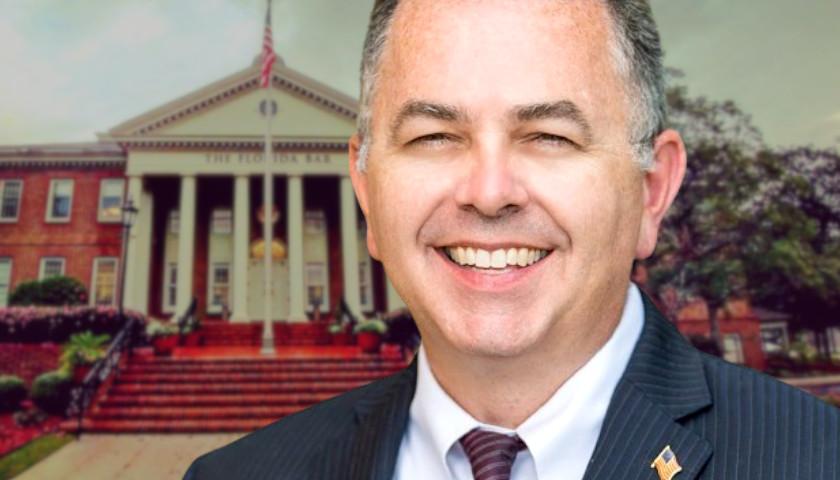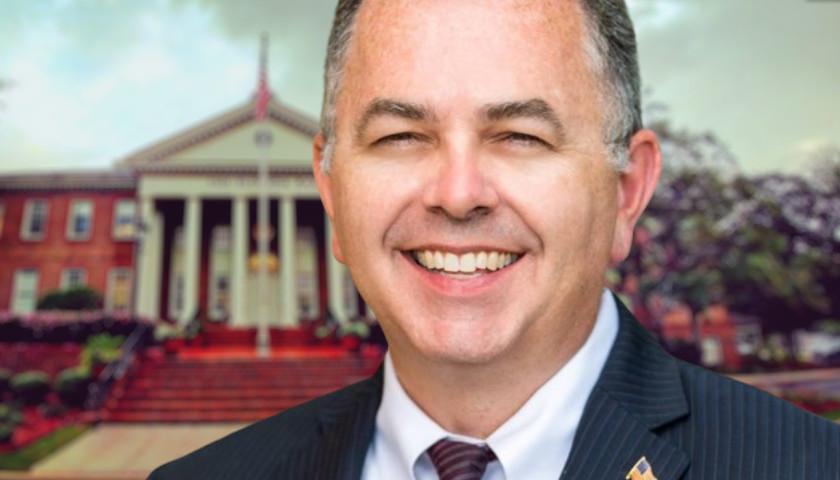Chris Crowley, a conservative attorney in Florida, filed an appeal with the Florida Supreme Court last month contesting a 60-day suspension of his law license for exercising free speech during his political campaign for the state attorney’s office in Florida’s 20th Judicial Circuit. His attorney said this is the first time an attorney has been disciplined for partisan political speech in Florida, and likely anywhere in the U.S.
Crowley, a decorated Gulf War veteran, said the Florida Bar should be subject to the state’s anti-SLAPP law, which prohibits using the courts to suppress free speech. SLAPP stands for Strategic Lawsuits Against Public Participation.
A Referee for the bar disciplined him for referring to his opponent Amira D. Fox, who eventually won, as “corrupt” and “swampy” and for observing that she had “close family ties to the [Palestine Liberation Organization (PLO)] terrorist organization.”
Fox’s uncle served on the executive committee for the PLO, her father said in an autobiography titled “From Palestine to America.” An investigation found that “Fox campaigned during working hours,” and she admitted “that she was required to repay $1,458.00 to the State after receiving pay for time exceeding her allowed leave after human resources raised the issue of her overpayment.”
The Referee who found Crowley violated an ethical rule prohibiting criticism of political candidates said that it wasn’t necessary to prove that Crowley had “actual malice,” despite that being the standard limiting lawsuits against public officials over defamation. The Supreme Court held in the landmark case New York v. Sullivan that if a plaintiff in a defamation lawsuit is a public official or candidate for public office, then not only must they prove the normal elements of defamation — publication of a false, defamatory statement to a third party — but they must also show that the statement was made with “actual malice;” that the defendant knew the statement was false or recklessly disregarded whether it might be false.
The ethical rule Crowley was accused of, which is standard across most jurisdictions in the U.S., is a vague, overly broad ethical rule often used to target conservative attorneys and frequently criticized for violating the First Amendment. R. Regul. Fl. Bar 4-8.2(a) states, “A lawyer shall not make a statement that the lawyer knows to be false or with reckless disregard as to its truth or falsity concerning the qualifications or integrity of a judge, mediator, arbitrator, adjudicatory officer, public legal officer, juror or member of the venire, or candidate for election or appointment to judicial or legal office.”
Crowley said “the Referee held that ‘[t]he burden is on [Crowley] to prove he had an objectively factual basis to make the statements,’ and thus ‘[t]he Florida Bar’s complaint does not need to allege actual malice.’” He argued, “There is no evidence that Crowley had a high degree of awareness of any probable falsity of his statements, which he consciously disregarded when he made the statements.”
The Referee used the same reasoning to find Crowley guilty of violating R. Regul. Fl. Bar 3-4.3, an ethical rule that says in part, “The commission by a lawyer of any act that is unlawful or contrary to honesty and justice may constitute a cause for discipline whether the act is committed in the course of the lawyer’s relations as a lawyer or otherwise.”
Since the Referee’s findings were issued, Crowley said the Supreme Court issued a decision in Counterman v. Colorado, which further restricted violations of the First Amendment that “penalize speech based solely on an objective or negligence standard without proof of a more culpable, subjective mens rea of the speaker.” However, the Referee responded to a motion during follow-up proceedings and said the new case doesn’t apply to bar disciplinary proceedings.
Crowley asked the court to find R. Regul. Fl. Bar 4-8.2(a) is unconstitutional since it “discriminates based on content involving disfavored subjects about specific categories of people.” He cited the Supreme Court case R.A.V. v. City of St. Paul, which held that “the government may proscribe libel; but it may not make the further content discrimination of proscribing only libel critical of the government.”
Crowley said “that is exactly what Rule 4-8.2(a) does. … [A] rule proscribing only defamation impugning certain types of government officials and persons — i.e., ‘on the basis of the subjects the speech addresses’ … is facially unconstitutional, just like the ordinance in R.A.V.”
Crowley also cited the Fourth Circuit Court of Appeals case Grimmett v. Freeman, where the court struck down a law in North Carolina because it “criminalizes truthful derogatory statements so long as the speaker acts in reckless disregard of a statement’s truth or falsity.” Similarly, Crowley said “Rule 4-8.2(a) states that a ‘lawyer shall not make a statement’ — but there is no requirement for the statement to be false in order to penalize the lawyer.”
The Referee said that “Crowley “[c]laim[ed] his political opponent was Muslim[,]…directly putting her religious beliefs at issue.” However, Crowley said he never brought up Fox’s religion; he “did not know Ms. Fox’s religious background and he did not care.” The Referee referenced an article Crowley posted an excerpt from, titled “More Muslim Candidates for Political Office.” The paragraph Crowley posted from the article did not mention that Fox was a Muslim. It explained her family ties to the PLO.
Crowley said the Referee criticized him for “laugh[ing] throughout” a radio interview where “the host opened by stating ‘this race has been nasty…. from her, just basically short of strapping up for ISIS, to you being a felon, I mean the stuff going on has been nothing short of ridiculous but hey, look, its politics.’” Crowley said he didn’t laugh throughout the interview, but only after the host said “this race has been nasty,” and after the host said Crowley was labeled a felon. He did not laugh after the host referenced ISIS.
The Referee claimed that some other statements Crowley made about Fox were false, but Crowley said he had a good-faith basis to make them. One statement accused Fox of being part of an effort to get him arrested for his role in a raffle for his campaign. Another was his statement that Fox had a 39 percent conviction rate.
Crowley noted that previous bar disciplinary cases have held that “any interpretation of [Rule 4-8.2(a)] in an election context must take into account the First Amendment protections for speech in election campaigns,” and “there inevitably is some imprecision in language used during the heat of a political campaign,” which “is not necessarily a violation of [Rule 4-8.2(a)]” as the Rule “does not require absolute precision in the expression of political speech as part of an election campaign.”
Due to that reasoning, the court of appeals in Maryland found in Att’y Grievance Comm’n of Md. v. Stanalonis that in a “hotly-contested primary [judicial] campaign,” an attorney’s false statement in a campaign flyer that his opponent (who was a current judge) “opposes registration of convicted sexual predators” did not satisfy the subjective test for recklessness.
Additionally, Crowley said “[t]he Maryland court further observed that “[t]he drafters of the model rule from which [Rule 4-8.2(a)] is derived apparently intended to import [the New York Times subjective] test into the rule.”
Crowley asked the court to consider other options if Rule 4-8.2(a) is not found unconstitutional, including remanding for a new trial by an “unbiased Referee” or merely admonishing him.
– – –
Rachel Alexander is a reporter at The Arizona Sun Times and The Star News Network. Follow Rachel on X/Twitter. Email tips to [email protected].
Photo “Chris Crowley” by Chris Crowley, Conservative Republican. Background Photo “Florida Bar Building” by The Florida Bar.





